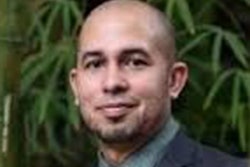Growing up in the Washington, D.C. area, Dr. Hanadi Hamadi, always wanted to have a career that was connected to health, but she wasn’t really sure what that would be. Initially, she thought she wanted to change people’s lives and make “everything better” but later realized what she really wanted to do is make the health care system “more appropriate.”
“I always wanted to teach and educate but I didn’t see academia as the only avenue for it,” says Hamadi. “You can teach in any avenue, but academia seemed to be the most feasible gateway to touch a lot of individuals and be able to communicate my message and translate some of the things that I find interesting and work on and study regarding the health care system.”
Hamadi, 32, is now an associate professor in the department of Health Administration at the University of North Florida, where she teaches three courses a semester with an average class size of about 40 students.
Hamadi research focuses on the diversity of health care as well as disparities in access to care.
“You see the more human side of the policy, then some of the reasons why individuals want to push a certain policy or not and you get to see a little bit of the political agendas that come into play and people’s personalities and belief systems,” Hamadi adds.
She has also made strides in advocating for student success, leading her department in a second-year report to the Commission of Accreditation of Healthcare Management Education (CAHME) for its Masters in Health Administration Program.
Hamadi designed an innovative way to integrate high competency levels into Canvas (a learning management system for students and instructors to access course resources) and to make one-on-one advising possible through the online platform.




















